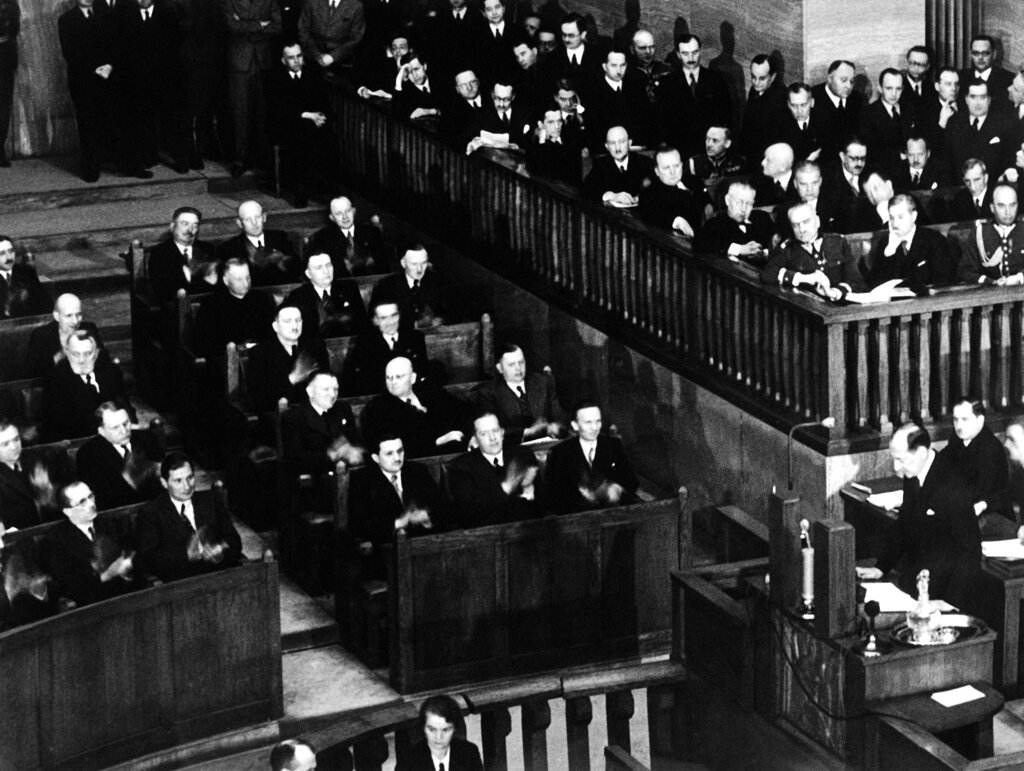Eighty-five years ago, on May 5, 1939, a momentous event unfolded in the Polish parliament, the Sejm, that captured the attention of the world. Józef Beck, Poland’s foreign minister, stood before the assembly and vehemently rejected the aggressive demands made by Adolf Hitler in his Reichstag speech on April 28. That day, as political leaders from Washington to Tokyo listened intently, Beck’s words would redefine Poland’s stance on international aggression and diplomacy.
Even before Beck uttered his first words, there was a strong belief that this would be a historic speech. The decision was in the hands of the Polish government as to how Germany would continue its march towards the next European war — a war that almost all of Europe, still scarred by the slaughter of two decades ago, wanted to avoid or delay as much as possible.
After annexing Austria and de facto annexing Czechoslovakia, Germany planned to first strike France to secure its rear, and then, together with Poland and other smaller partners, attack the mighty Soviet Union to fight for the “living space” often invoked by Hitler.
The fact was that Poland did not want to go hand in hand with Hitler against the Soviets. In Warsaw, the priorities were different, and the main strategic idea of maintaining balance and peace between these two neighboring powers was set by the Polish diplomacy under Marshal Józef Piłsudski.
The anticipation of Beck’s speech had been palpable, with tens of thousands of Poles pausing their daily routines to listen at precisely 11:15 a.m. The speech was not only a response to Hitler, but also a declaration of Poland’s sovereignty and refusal to be coerced into subservience. Hitler had nullified the non-aggression pact of 1934, blaming Poland for the crisis due to its alliances with Western powers, and demanded concessions including the annexation of the Free City of Danzig (Gdańsk), construction of an extraterritorial highway and railway, and Poland’s participation in the Anti-Comintern Pact.
In a firm and measured tone, Beck refuted Hitler’s address, point by point. He defended Poland’s decisions, refused to alter the status of Danzig, and offered alternative proposals to the Reich. The speech’s conclusion emphasized the high cost of peace but underscored that there was one thing more precious than peace itself: honor.
“Peace is a precious and desirable thing, and our war-scarred generation surely deserves a period of peace,” Beck stated. “However, like almost all things in this world, peace has its price — high but measurable. We in Poland do not know the concept of peace at any price. There is only one thing in the life of individuals, nations, and states that is priceless: honor.”
The aftermath of Beck’s speech was a surge in patriotic and anti-German sentiment across Poland. According to reports from the German Ambassador Hans Adolf von Moltke to his superiors, the mood on the streets was so fervent that any move toward cooperation with Germany might have sparked a revolution.
How would history have actually unfolded had Beck rejected the allies’ proposal and entered into a strategic cooperation “for survival” with Germany, as the Romanians, Finns, or Hungarians did?
Historians have long debated Beck’s decision. While some argue that his insistence on honor led to Poland’s devastation in the subsequent war, most, including prominent historians like Professor Andrzej Nowak, believe that acquiescence would have reduced Poland to a mere vassal state. The broader historical perspective reveals that Beck’s strategy was shaped by a complex array of factors, including Poland’s long-standing diplomatic culture and its geographical and strategic imperatives.
Today, as Poland navigates its place between powerful neighbors, Beck’s speech remains a lesson in the timeless mechanics of history and geopolitics, proving that the narrative of nations is never truly complete but continuously evolving. Beck’s defiance against overwhelming odds continues to resonate, underscoring the enduring relevance of strategic decision-making grounded in national integrity and honor.






